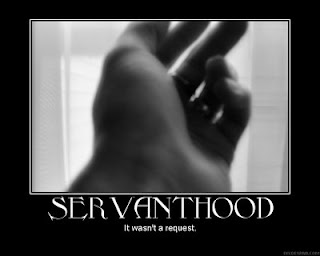I have to admit up front that I have an exceedingly bad reaction to the name of the concept, "servant leadership." I think some of the reaction is feminist: I am not anyone's servant. Just because I do not pursue leadership roles in an effort to achieve power and privilege does not mean I want to become a servant to my peers or the larger organization of which I am a part. I am also turned off by the way the concept of the servant leader has been picked up and used by Christian ministers, business leaders, and academics (see book cover below). I do not approach academic administration wondering "What Would Jesus Do?" and I am somewhat uncomfortable with others approaching their work that way.
This issue came up for me as I was working on a statement of my leadership philosophy/approach. I reviewed a few available online to see what people were saying about their own philosophies, and I found that a number of these statements described the author as a servant leader. I have read some about the concept and find it in some ways perplexing and irritating.
The central practices of servant leadership, as defined by Dr. Kent M. Keith, CEO of the Greenleaf Center for Servant Leadership, are "self-awareness, listening, changing the pyramid (ie., flatten the hierarchy) , developing your colleagues, coaching not controlling, unleashing the energy and intelligence of others, and foresight." Most of these ideas are pretty straightforward and seem to fall under the rubric of reflexivity and openness to input by people across the organization, concepts that seem pretty straightforward and don't rely on the servant metaphor.
I am a strong believer in finding opportunities for growth for people across the institutional spectrum: send your student advising staff--and not just your faculty--to an out-of-town conference; include students on decision-making committees and be sure they have voting rights; encourage your support staff to participate in leadership skill development opportunities on campus, and so on. I do think that, taken to their extreme, a sole focus on bettering everyone who works at your organization can take you away from your other institutional goals--goals you are paid to achieve!
I also think we have to own that these behaviors are not really all about "serving others," but serving the larger organizational goals. Sometimes, when the staff in my unit get a new perk, they bring renewed goodwill and energy to the program. When I make decisions by considering what the other students, faculty, and staff members want, I am thinking about how to make this decision something people will actually implement and maintain. Act too high handed in a university context, and you will find that your policy/practice/program comes to nothing. The faculty forgets you said it, the students ignore it, and the staff creates lots of ways to undermine it. Put another way, buy-in facilitates actual change.
Another problem with the servant leader model, identified by Mitch McCrimmon, is that administrators who claim to be "servants" to people who work for/with them and then have to fire them (or, in a higher educational context, assign them class sections they don't want, deny resources for travel, or deny someone tenure) make make these "servant leaders" seem like a big, fat hypocrites. The truth is that I have power over resources and opportunities, and I have to make decisions about how they are distributed that some people in the organization are going to find hurtful or not in their best interests. But as an administrator, I serve the organization as well as my colleagues, staff, and students.
Finally, I think my biggest problem with the "servant leader" identity is that when I am serving in the role of university administrator, it is my job. It is not an avocation, but in fact a vocation for which I am paid. I am a professional, and I engage in leadership as a component of my role as administrator. I am evaluated by my colleagues and superiors for my performance in meeting organizational goals. A thoughtful organization would consider such issues as staff development and support, informed decision making, and creativity in evaluating my performance as an administrator.




3 comments:
Thanks for this post. You've articulated a lot of the problems I see with the "servant leadership" concept.
I see your points, for sure, esp the way that it's not as revolutionary for women to be seen as servants or the christian connotations. I still like the ideas, though, as a counter to the traditional "leader as wielder of power" models. I find it empowering to treat people as the ones you are there to serve and not as people who are there to serve you. I think that in it's model form, it's the most humane and socially just leadership perspective out there, honestly.
With ya, LP. The whole conceit of "servant leadership" strikes me as creepy. In practice, it usually boils down to narcissism masquerading as self-sacrifice: "Look at me! Look at how virtuous and noble I am!"
Bleah. Better to serve the mission of the institution, even when that involves saying "no" to certain people.
Post a Comment